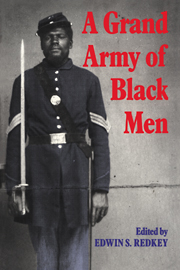Book contents
- Frontmatter
- Contents
- Preface
- Acknowledgments
- List of Abbreviations
- Introduction: For Freedom and Equality
- 1 Black Soldiers in White Regiments
- 2 South Carolina, Georgia, and Florida
- 3 Virginia and North Carolina
- 4 The Gulf States
- 5 Occupation Duty
- 6 For the Rights of Citizens
- 7 The Struggle for Equal Pay
- 8 Racism in the Army
- 9 The Navy
- 10 War's End
- Index
- Cambridge Cultural Social Studies
- Frontmatter
- Contents
- Preface
- Acknowledgments
- List of Abbreviations
- Introduction: For Freedom and Equality
- 1 Black Soldiers in White Regiments
- 2 South Carolina, Georgia, and Florida
- 3 Virginia and North Carolina
- 4 The Gulf States
- 5 Occupation Duty
- 6 For the Rights of Citizens
- 7 The Struggle for Equal Pay
- 8 Racism in the Army
- 9 The Navy
- 10 War's End
- Index
- Cambridge Cultural Social Studies
Summary
SERGEANT PETER VOGELSANG, a member of a prominent Brooklyn, New York, family, had left his job as a clerk and enlisted in the 54th Massachusetts Infantry as soon as the recruiters had come his way in April 1863. Now, two years later, the war was over. He and his regiment had won glory in battle, and they had won their campaign for equal pay. They had finished their task, and they were ready to go home.
But Vogelsang and the others would not get back to Boston until late in August 1865. The four months between the end of the fighting and their triumphant return to the Boston Common were spent in and around Charleston, South Carolina, There they kept law and order and helped the liberated slaves deal with freedom. For many of the men, time seemed to drag, but not for Vogelsang. As Quartermaster Sergeant he kept busy getting supplies and distributing them to the scattered parts of the regiment. And because, at age forty-eight, he was one of the oldest men in the 54th, he was frequently asked to settle problems among the soldiers.
So widely respected was Sergeant Vogelsang at war's end that his commander, Colonel Edward N. Hallowell, nominated him to become a commissioned officer. He must have been quite pleased, because only one other black soldier, Sergeant Stephen Swails, had been commissioned in the 54th, and most people could not tell that Swails was “colored.” Vogelsang, on the other hand, was visibly one of the blackest men in the regiment; the nomination rewarded his battle record and his leadership.
- Type
- Chapter
- Information
- A Grand Army of Black MenLetters from African-American Soldiers in the Union Army 1861–1865, pp. 281 - 296Publisher: Cambridge University PressPrint publication year: 1992

